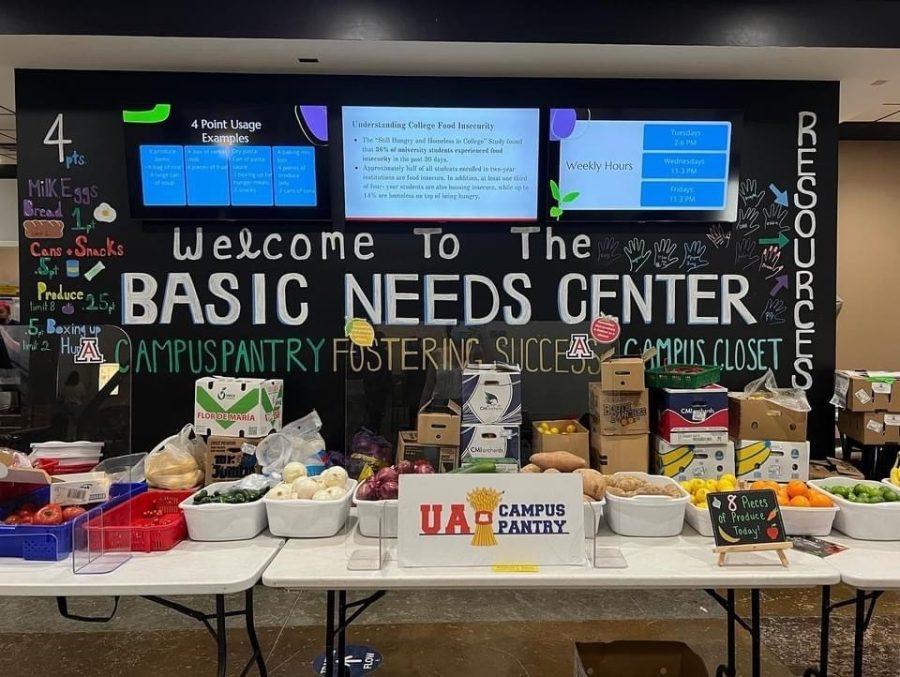R.J. Reliford II has worked at the University of Arizona’s Campus Pantry for the past four years. When he was a freshman, the pantry was welcoming between 500-700 students per week, giving members of the UA community access to fresh food at no cost. Now, the pantry sees about 1,600 students per week.
While Reliford is glad that their services are more widely known, this creates challenges. Namely, the pantry is receiving basically the same amount of support that they were four years ago, and it is no longer sufficient.
Reliford is a senior studying information science and game design and development. This is his second year serving as one of the Campus Pantry student directors.
He explained that the pantry receives a lot of their money through grants and donations, but more support from upper administration is needed for long-term sustainability.
“It’s not enough,” Reliford said. “We’ve been getting the same amount of support from the [UA] since four years ago when I first joined the program.”
The staff has expanded in the past few years to 15 employees, but more workers are still needed to keep up with demand.
Bridgette Riebe is the full-time coordinator of Campus Pantry and Campus Closet, which provides clothes to students.
“Our team has grown in number of student employees but not in full-time staffing,” Riebe said. “That’s a problem because a lot of what happens to get the food in the pantry requires more than a 10 hour per week job.”
One of the biggest challenges for the pantry is getting enough food to distribute. They usually place orders from Walmart or Fry’s and pick them up but have had to increase the size and frequency of their orders.
“The main difficulty is just getting enough food items into our space. And because we’re seeing 1,600 people per week, we have to make multiple different grocery trips which is taking up a lot of time,” Riebe said.
She explained that their main priority is securing funding so that the pantry can continue to exist in the future.
“We’re okay for this year, until July,” she said. “What we need to discuss now at this point is our funding for next year.”
This year isn’t the first time Campus Pantry has raised these concerns. At the end of last year, they released a letter on Instagram detailing their need for increased support and specifying changes they would like from the university.
“We are in dire need of additional institutional support and feel abandoned by the university for their lack of participation in our operations,” the letter read.
Fortunately, Riebe said they are in the process of hiring more full-time staff during this school year.
“Once we get that position that should make some difference, but then we’ll still need additional funding and additional potential allocation of funds for in the future to be able to support those positions long-term,” Riebe said.
They also utilize volunteers and have about 90 currently. However, due to scheduling and high demand, they still find themselves in need of more consistent volunteers.
Campus Pantry’s aim is to reduce food insecurity on campus and to ensure everyone who needs help accessing food is getting it.
“I feel really proud that so many people are coming to our resource now, because that means that we’re probably reducing the stigma slightly of what food insecurity is. We’re giving people an example of where they can go to get support,” Riebe said.
Unfortunately, this hard work can lead to burnout, especially when there aren’t adequate resources for the pantry. The pantry has recently had to reduce their hours for the rest of the semester. On their Instagram, they cited “grocery shortages” as one of the reasons. Last summer, they nearly had to close down due to a lack of resources, but were able to keep limited hours.
“Food insecurity does not go away when we’re not distributing,” Reliford said.
The Campus Pantry is run through the UA student government, the Associated Students of the University of Arizona. ASUA Senator Jack Haskins has worked with the pantry in the development of mandatory meal plans, as well as to increase awareness about volunteering.
“It’s more than apparent that they have been overworked,” Haskins said.
Haskins is trying to get more students involved in the pantry’s effort by encouraging donation drives and setting up presentations about how to volunteer. ASUA is also working on a system to make their senators available for consistent volunteering to help meet demand.
“That massive need needs to be met with equal support,” Haskins said.
Riebe added that the whole Basic Needs Cuaphenter, including Campus Closet and counseling services, needs more staffing and funding from the school.
“Basic needs support needs to be a top priority of our university,” Riebe said.
Follow Erika Howlett on Twitter









